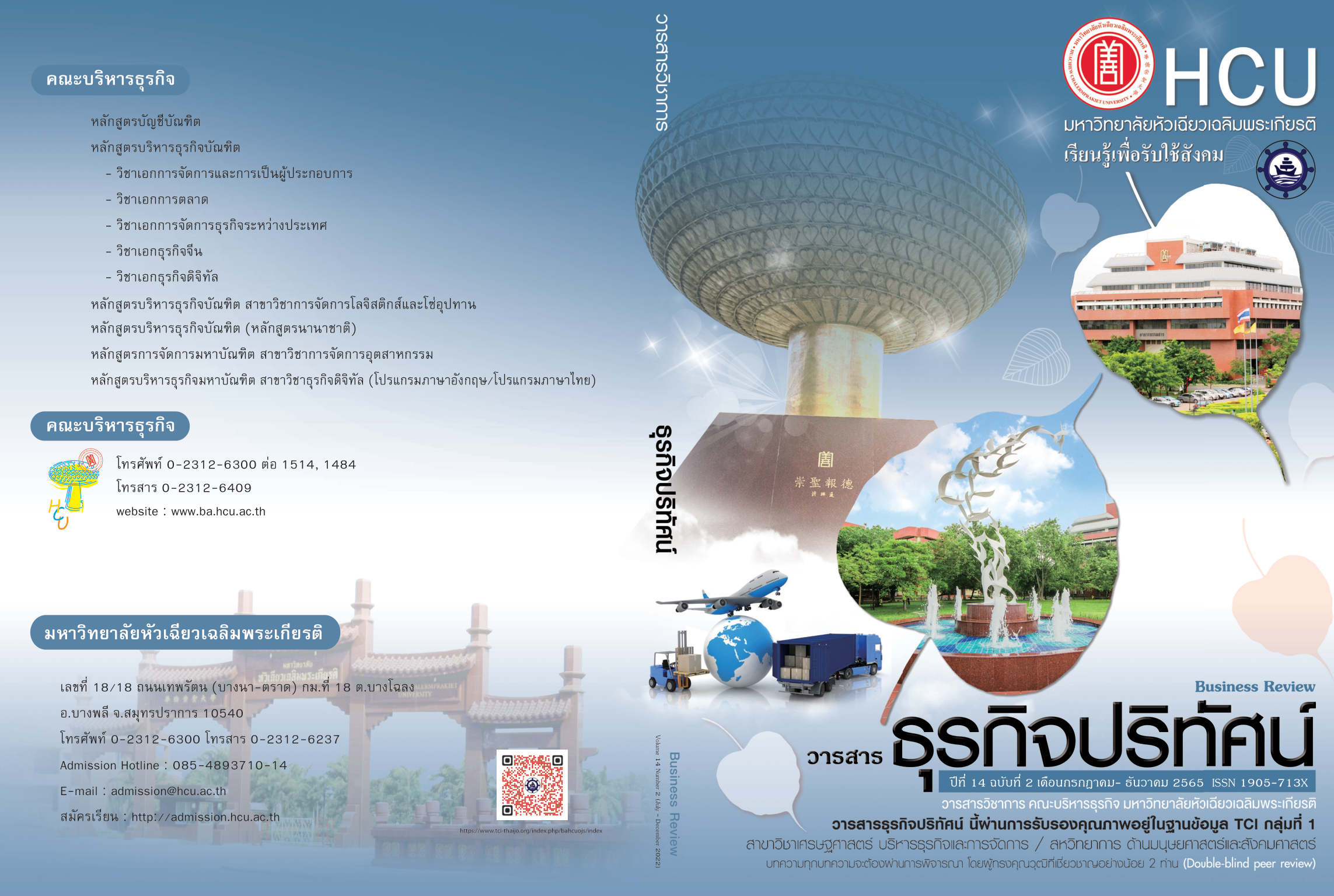The Analysis of the Causal Factors in Online Purchasing Intention in Health and Beauty Products
Keywords:
Purchasing intention, Consumer trust, Health and beauty products, Online StoreAbstract
The objective of this research is to study the behavioral intentions toward the online stores by considering the consumer trust in an offline store, perceived confidence of shopping at the online store, information search intention at the online store. Samples were 210 customers aged from 18 to 37 who had purchased health and beauty products through offline and online channels. Data was gathered by online questionnaire. The result reveals that the consumer trust in an offline store is directly affected neither behavioral intentions toward the online stores nor, information search intention at the online store but there is positively affected perceived confidence of shopping at the online store.
References
Chu, S. Y., Wu, C. M., Wu, L. F., & Chen, Y. F. (2016). Does an established offline store drive online purchase intention. International Journal of Business and Information, 11, 432-465.
Davis, F. D. (1989). Perceived usefulness, perceived ease of use, and user acceptance of information technology. MIS Quarterly, 13(3), 319-339.
Euromonitor. (2019). Health and Beauty Specialist Retailers in Thailand (Country Report). Retrieved March 6, 2020, from Euromonitor Website: https://www.euromonitor.com/health-and-beauty-specialist-retailers-in-thailand/report
Fishbein, M. A., & Ajzen, I. (1975). Belief, attitude, intention, and behavior: an introduction to theory and research. Reading, MA: Addison-Wesley.
Forsythe, S. M., & Shi, B. (2003). Consumer patronage and risk perceptions in Internet shopping. Journal of Business research, 56, 867-875.
Hair, J. F., Black, W. C., Babin, B. J., & Anderson, R. E. (2010). Multivariate Data Analysis (7th edition). New Jersey: Pearson Prentice Hall.
Jordan, M. A., & Haywood, T. (2007). Evaluation of Internet Websites Marketing Herbal Weight-Loss Supplements to Consumers. Retrieved March 12, 2020, from NCBI Website: http://www.ncbi.nlm.nih.gov/pubmed/18047451.
Kim, H. H., & Jihyun, K. (2009). The effect of offline brand trust and perceived internet confidence on online shopping intention in the integrated multi-channel context. International Journal of Retail & Distribution Management, 37(2), 126-141.
Kim, J., & Park, J. (2005). A consumer shopping channel extension model: attitude shift toward the online store. Journal of Fashion Marketing and Management, 9(1), 106-121.
Koufaris, M., & Hampton-Sosa, W. (2002). Customer trust online: examining the role of the experience with the web site. CIS Working Paper Series, Zicklin School of Business, Baruch College, New York.
Kuan, H. H., & Bock, G. W. (2007). Trust transference in brick and click retailers: An investigation of the before-online-visit phase. Information & Management, 44(2), 175-87.
Kustiwi, I. A., & Isnalita, I. (2018). Trust and Purchasing Intention in E-Commerce: Lazada Indonesia. Advances in Social Science, Education and Humanities Research, 165, 28-32.
Park, J., & Stoel, L. (2005). Effect of brand familiarity, experience and information on online apparel purchase. International Journal of Retail & Distribution Management, 33(2), 148-160.
Pavlou, P., & Eugenson, M. (2006). Understanding and predicting electronic commerce adoption: an extension of the theory of planned behavior. MIS Quarterly, 30(1), 115-43.
Rubio, N., Oubina, J., & Villasenor, N. (2014). Brand awareness–Brand quality inference and consumer’s risk perception in store brands of food products. Food Quality and Preference, 32, 289-298.
Schlosser, A. E., White, T. B., & Lloyd, S. M. (2006). Converting web site visitors into buyers: How web site investment increases consumer trusting beliefs and online purchase intentions. Journal of Marketing, 70(2), 133-48.
Small, A. R. (2004). Trust Relationships: An Exposition of Three Propositions. Master’s Thesis, University of Saskatchewan Saskatoon, CA.
Wolfinbarger, M., & Gilly, M. (2001). Shopping online for freedom, control and fun. California Management Review, 43(2), 34-55.
Downloads
Published
How to Cite
Issue
Section
License
Copyright (c) 2022 Business Review Journal

This work is licensed under a Creative Commons Attribution-NonCommercial-NoDerivatives 4.0 International License.
All articles published in the Business Administration and Management Journal Review are copyrighted by the journal.
The views and opinions expressed in each article are solely those of the individual authors and do not represent those of Huachiew Chalermprakiet University or any other faculty members. Each author is fully responsible for the content of their own article. Any errors or issues found are the sole responsibility of the respective author.




